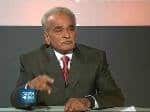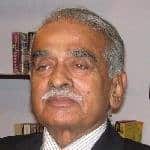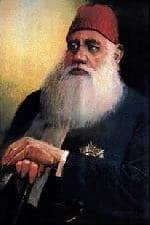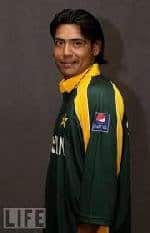Former Governor Punjab
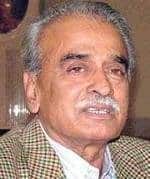
Ghulam Mustafa Khar was born in the family of Kharrals in Kot Addu, a village of Muzaffar-garh, district of the Punjab on August 2, 1937. His father, Mohammad Yar Khar, one of the largest landowners of the district, was granted the title of Khan Sahib by the British crown. Ghulam Mustafa Khar was educated at Aitchison College Lahore. Like his father he was not only a prestigious feudal lord but also an absolute ruler of his vassals. The property and land of his father became the main source of his politics, power and prominence. His political career started while he was 24. He was elected to the National Assembly in 1962 and subsequently in 1965 from the platform of Muslim League.
After sometime in the political wilderness (famously calling Bhutto the ‘maharaja of Larkana’) he rejoined Bhutto before the 1977 general elections. Arrested after the imposition of martial law, Khar slipped out of the country after an understanding with General Chishti (a General Zia-ul-Haq’s comrade). He promptly went back into opposition politics after leaving the country a fact which infuriated Zia and led to the withdrawal of an offer to Khar’s close friend Ghulam Mustafa Jatoi to become Prime Minister.
Returning to Pakistan before 1988, Khar had by then had fallen out with Benazir Bhutto and with Army backing created the National Peoples Party (NPP) along with Jatoi and other PPP dissidents. The Army believed they needed to neutralize Benazir Bhutto’s influence in Sindh with a Sindhi and wanted to use Jatoi for that, Khar in the meantime contested for several seats in the Punjab and won all of them. However, Jatoi suffered a shock defeat.
Ghulam Mustafa Jatoi became caretaker Prime Minister in 1990 after Benazir’s removal but Punjab’s Chief Minister and Khar’s rival Nawaz Sharif outmaneuvered Jatoi and ended up being Prime Minister. Khar eventually ended up rejoining the PPP before the 1993 elections. Re-elected, he served as Federal Minister for Water and Power under Benazir Bhutto. Defeated in the 1997 election, he was unable to contest the 2002 elections because of a restriction placed on non-graduates from contesting the elections.
Khar then rejoined the PPP and began campaigning to become the Party President for Punjab province. In 2007, Khar was removed from the PPP by Benazir Bhutto due to his controversial statements regarding the deal between Benazir and General Musharraf. He also had a war of words with the secretary general of the PPPP Jehangir Badar , who was called a political orphan by Khar.
Khar has been married numerous times and his relationship with Tehmina Durrani, one of his seven wives is in particular famous, as she wrote a book called “My Feudal Lord” on her husband , in which she describes the alleged abuse given to her by Khar.
In detail coverage on his personality traits, chronology of the events in Pakistan’s political landscape etc can be found in the book “My Feudal Lord” by Tehmina Durrani.
In 1967 he fell under the influence of the charismatic charm of Zulfikar Ali Bhutto, who was also impressed with his abilities and began to love him like a son. Came to be his protégé Khar, and that he left his residence, and lived for several years with Bhutto at his residence at 70 Clifton in Karachi in order to find out a large number of political tactics and twists. By and became a close ally and confident of Bhutto, one of the founding members of the Pakistan People’s Party. Before the fall of Dhaka, he achieved a great victory in the elections and Bhutto in 1971 when he replaced General Yahya and head of martial law in Pakistan, appointed ruling Khar and official law of self-defense Punjab. When the 1973 Constitution was adopted and Bhutto became prime minister of Pakistan, as Ghulam Mustafa Khar bag and Prime Minister of the state of Punjab.
As an administrator Mustafa Khar was famous for his tactics and trickeries. He was, indeed, a true protégé of Bhutto and in a prolific manner used the party slogan: “The fountainhead of power is the people of Pakistan”. Once the police force went on strike and the state of law and order seemed to be at stake. But he sharply and shrewdly handled the situation. He declared the action a mutiny and appealed to the people to offer their services to manage traffic and work at the police posts. At the same time he gave ultimatum to the police that anyone who did not return to work within 24 hours would be fired. This modus operandi effectively worked and the police soon called off their strike. From that day onward, he began to be known as Sher-i-Punjab (Lion of the Punjab). Since Ghulam Mustafa Khar enjoyed more clout with Zulfikar Ali Bhutto, he began to take crucial initiatives without the prior approval of Bhutto and wanted to establish his image as a strong second-line leader of the Peoples Party. Bhutto was also impatient with him as a chief minister since he (Khar) wanted the federation to give the province its rightful share. When disagreements on policy matters and personal appointments sprang up to a great extent, he was forced to resign in 1974 after the Islamic summit was held at Lahore. However he was reinstated and remained Governor of the Punjab for the second time from 13 March 1975 to 31 July 1975 while Hanif Ramey remained the Chief Minister of the Punjab. In 1977 he was appointed as Special Assistant to the Prime Minister.
After the 1977 coup, when Martial Law was imposed, Ghulam Mustafa Khar was also jailed along with other PPP leaders. After he was released, he fled to England along with his wife Tehmina Durani and remained in self-exile for eleven years. He had also tried to convince Bhutto to leave the country and “live to fight another day”. But Bhutto chose to stay and fight. A military court sentenced Mr. Khar in absentia to fourteen years’ imprisonment for his part in an attempted coup against General Zia. During his period of self-exile, he did continue his clandestine activities to restore democracy and remained a leading opponent of General Zia-ul-Haq. He thought that the army gobbled up Pakistan’s scare sources, kept the people illiterate and in permanent poverty and deprived them of a better future. The Economist published a four-page article discussing his idea of military rule as a permanent stumbling block to the progress and development of the country. His statement that he would re-enter Pakistan on Indian tanks, if necessary was severely slated. However, in 1988 he returned with his head bowed and begged the nation to forgive him. As many cases were pending against him comprising his conspiracy to engineer a coup against Zia, he was arrested at Karachi airport. His friends, political workers and particularly his wife Tehmina fought relentlessly for his release with the result that he was released in 1988 just before the elections. However, he was no more associated with PPP as sulking at Benazir’s prominence, he considered himself as the logical successor to the Bhutto legacy. Besides, he was shocked to learn that Benazir Bhutto was not going to offer him the post of Party President in the Punjab. Therefore, he decided to form a new party National Peoples Party (NPP) along with his old friend Ghulam Mustafa Jatoi.
In 1988 elections, he was once again a member of the National Assembly. In 1990 when Prime Minister Benazir was dismissed and a caretaker Government was formed by President Ghulam Ishaq Khan, Khar was sworn in as Federal Minister for Water & Power while Jatoi was appointed as the Caretaker Prime Minister. Subsequently he was elected member to the National Assembly in 1993. In 2002 his nomination papers were rejected on the ground that his membership of the party was no longer valid. Later, he wanted to rejoin the Pakistan Peoples Party but the party strongly condemned his entry to the party’s fold as the senior members of the party thought he could create serious problems in the future.
In matters of physical health Ghulam Mustafa Khar is highly self-disciplined person. He is fond of hunting (shikar) and picnics. During his youth, he used to take bath in freezing tap water because he deemed it useful for blood circulation and effective for thwarting the aging process. He likes to consume much yogurt, skimmed milk and honey, and spends two hours in doing his long exercises in yoga daily in the morning. That is why he looked young, smart, and wedding champion who skillfully and smugly scored nine wives. His last marriage was in 2002 with quite a young girl who happened to be a niece of his brother’s wife. It is said that most of his children from the previous wives came to attend the wedding and congratulate their father. Among his wives Tehmina Durrani is outstanding due to her well-known book My Feudal Lord. During her marriage to Mustafa Khar, she gave birth to four children but after fourteen years, she sought a divorce. Her book that gives an awkward and awful picture of her spouse received recognition and many awards domestically and overseas. It has been translated into thirty-six languages.
Ghulam Mustafa Khar Pictures
|
|
|
| ||||||||


